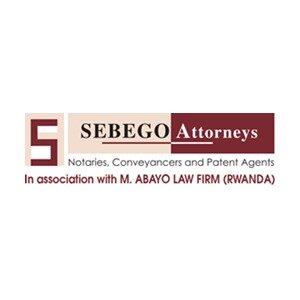Best Trademark Lawyers in Gaborone
Share your needs with us, get contacted by law firms.
Free. Takes 2 min.
List of the best lawyers in Gaborone, Botswana
About Trademark Law in Gaborone, Botswana
Trademark law in Gaborone, Botswana, is a crucial aspect of intellectual property law, designed to protect brand names, logos, and other identifiers that distinguish goods and services in the marketplace. Trademarks are governed by the Industrial Property Act, administered by the Companies and Intellectual Property Authority (CIPA). The aim is to prevent confusion among consumers and ensure that brands maintain their unique identities and reputations.
Why You May Need a Lawyer
There are several situations where you might require legal assistance in the field of trademark law in Gaborone, Botswana:
- Trademark Registration: A lawyer can help streamline the process of registering a new trademark, ensuring all legal requirements are met.
- Trademark Infringement: If someone uses a trademark that is identical or confusingly similar to yours, legal advice is crucial to pursue infringement actions.
- Trademark Renewal: Trademarks require periodic renewal; legal professionals can help you navigate this process to keep your trademark valid.
- Transactional Issues: Lawyers can assist with the transfer, licensing, and assignment of trademarks.
- Opposition Proceedings: If someone opposes your trademark registration, or you need to oppose someone else's, legal guidance is vital.
Local Laws Overview
The key aspects of local trademark laws in Gaborone, Botswana, include:
- Industrial Property Act: This act governs the registration and protection of trademarks.
- Registration Process: Trademarks must be registered with the Companies and Intellectual Property Authority (CIPA) to enjoy protection.
- Duration and Renewal: Once registered, a trademark is valid for a period of 10 years and can be renewed indefinitely.
- Grounds for Refusal: Descriptive marks, deceptive marks, and marks contrary to public order or morality may be refused registration.
- Infringement: The act also provides remedies for trademark infringement, including injunctions and damages.
Frequently Asked Questions
What is a trademark?
A trademark is a sign capable of distinguishing the goods or services of one enterprise from those of other enterprises. Trademarks help consumers identify and purchase a product or service based on whether it bears a trademark they trust.
How do I register a trademark in Gaborone, Botswana?
To register a trademark, you need to file an application with the Companies and Intellectual Property Authority (CIPA). The application must include the trademark, a list of goods or services the trademark will cover, and the applicable fees.
How long does the trademark registration process take?
The registration process typically takes several months, depending on the completeness of the application and whether there are any objections or oppositions.
What can be registered as a trademark?
Words, logos, symbols, colors, shapes, sounds-or any combination of these-that distinguish goods or services of one enterprise from another can be registered as trademarks.
How long does trademark protection last?
In Botswana, trademark protection lasts for 10 years from the date of registration and can be renewed indefinitely for successive 10-year periods.
Can I use my trademark before registration?
Yes, but it won't be legally protected until it's registered. Registering your trademark ensures you have exclusive rights to use it.
What should I do if my trademark is infringed?
If your trademark is infringed, you can seek legal remedies through court actions. An intellectual property lawyer can help guide you through the process.
Can a registered trademark be removed from the register?
Yes, a trademark can be removed on grounds such as non-use for five consecutive years or if it was registered fraudulently.
What is the difference between a registered and an unregistered trademark?
A registered trademark is legally protected and provides the owner with exclusive rights to use the mark. Unregistered trademarks have limited protection under common law but do not offer the same legal advantages.
What are the costs involved in trademark registration?
The costs include official fees for filing and maintaining the trademark, as well as professional fees if you engage an intellectual property lawyer. The exact amount can vary.
Additional Resources
For more information and assistance, you can contact the following resources:
- Companies and Intellectual Property Authority (CIPA): The primary body overseeing trademarks in Botswana.
- Ministry of Investment, Trade, and Industry: Offers support and information on intellectual property matters.
- Attorney's General Chambers: Provides legal advice and represents the government on legal matters.
- Botswana Innovation Hub: Provides support for innovators and entrepreneurs, including intellectual property services.
Next Steps
If you need legal assistance with trademarks, consider contacting a lawyer specializing in intellectual property law. Here’s how to proceed:
- Identify Your Needs: Clearly define the kind of assistance you require, whether it’s registration, renewal, or addressing infringement issues.
- Research and Contact a Lawyer: Look for reputable intellectual property lawyers in Gaborone, Botswana. Contact them to discuss your situation and arrange a consultation.
- Prepare Documentation: Gather all relevant documents and information related to your trademark to provide to your lawyer.
- Follow Legal Advice: Work closely with your lawyer, follow their guidance, and keep track of all legal proceedings and deadlines.
Seeking professional legal advice can help ensure that your trademarks are well-protected and any legal issues are effectively addressed.
Lawzana helps you find the best lawyers and law firms in Gaborone through a curated and pre-screened list of qualified legal professionals. Our platform offers rankings and detailed profiles of attorneys and law firms, allowing you to compare based on practice areas, including Trademark, experience, and client feedback.
Each profile includes a description of the firm's areas of practice, client reviews, team members and partners, year of establishment, spoken languages, office locations, contact information, social media presence, and any published articles or resources. Most firms on our platform speak English and are experienced in both local and international legal matters.
Get a quote from top-rated law firms in Gaborone, Botswana — quickly, securely, and without unnecessary hassle.
Disclaimer:
The information provided on this page is for general informational purposes only and does not constitute legal advice. While we strive to ensure the accuracy and relevance of the content, legal information may change over time, and interpretations of the law can vary. You should always consult with a qualified legal professional for advice specific to your situation.
We disclaim all liability for actions taken or not taken based on the content of this page. If you believe any information is incorrect or outdated, please contact us, and we will review and update it where appropriate.












